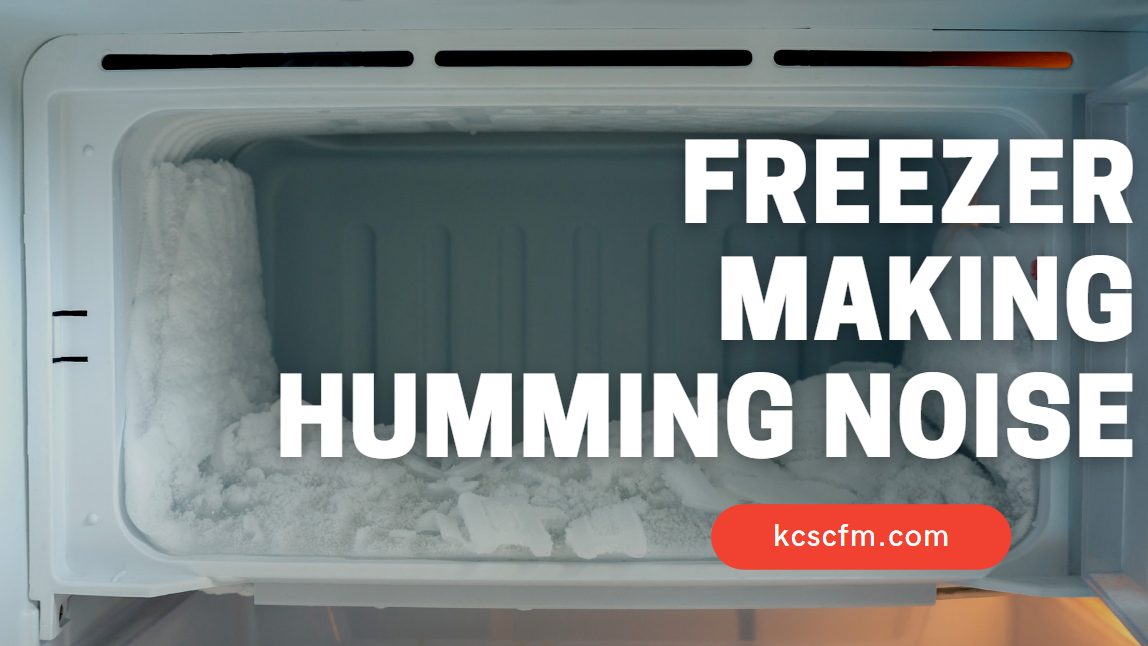It’s a freezer, so it’s going to make some noise. That said, if the noise is getting louder, or the unit itself is shaking, something could be malfunctioning, and you should address this problem ASAP. When the unit starts making strange noises, it could indicate something minor, like a chip of ice in the water-line, or a major problem with the compressor.
Just because your freezer makes a noise doesn’t mean it’s malfunctioning. Freezers are built to make some noises, but there are some red flags to look out for. If your freezer is louder than normal, it could be an indication that something is wrong inside.
If you hear a humming noise coming from your freezer, it could come from the evaporator fan blades, motor, or compressor. First, check if the fan blades are damaged or if there’s an ice buildup. If they’re okay, then check the motor and compressor. If everything checks out and the humming noise persists, it may be that the compressor is failing.
Freezers are an essential appliance in both the kitchen and garage. A refrigerator freezes food, so that it can be preserved for longer periods of time. That’s why it’s important to resolve any potential issues with your freezer as soon as possible. This will help prevent spoiled food, as well as unnecessary trips to the repairman.
Freezer Making Humming Noise – Troubleshoot And Diagnosis

The freezer is one of the most integral components of a home appliance. It keeps your food frozen and dehydrated for long periods of time. While it sometimes does its job in an effective manner, it does give off some telltale signs when there’s something wrong. One of these signs is a loud, high-pitched humming sound that emanates from your freezer whenever you open it.
That’s why it’s so important to repair any issues with your equipment right away — and know how to fix humming freezers the right way.
Freezers are notorious for making loud humming noises, so this is a troubleshooting guide for your freezer that you should keep in mind.
1. Evaporator Fan Blade Is Frozen
Dirt. Ice buildup and other debris can clog your evaporator fan. If this happens, it will reduce the amount of air that passes through your freezer — slowing down the entire cooling process to a crawl.
The evaporator fan is a key component in the cooling system of a freezer. If it is damaged, it could mean that your frozen food is not as cold or frozen as it should be — and you might also hear an unusual noise.
The freezer evaporator is the part of your freezer that keeps everything cold. The evaporator works by drawing air inside the freezer, then blowing it over a coil and back into the freezer. This coil acts as a heat exchanger, transferring the heat from the air to the cold refrigerant in coils. By doing this, your evaporator helps keep your freezer at a consistent temperature throughout, producing ice quickly and keeping food cold for longer.
If you ever hear a loud humming noise coming from your freezer, then you need to check for frost build-up on the evaporator. When this happens, the rotating fan blade will continually hit the ice, causing that loud noise.
In some cases, the frost and ice buildup inside the freezer can cause the fan blade to hit the ice and create a loud sound when in use.
2. Evaporator Fan Is Damaged
The whole appliance plays a key role in ensuring that food is kept frozen until you are ready to use it. If the evaporator fan blade is damaged or broken, it will cause the freezer to stop working effectively.
If your freezer isn’t keeping things cold, this could be due to a defective evaporator fan. This fan is what cools by forcing cold air across the evaporator coils and into the rest of the fridge. If there’s a problem with the fan (or its blades), it will stop running and won’t be able to distribute cold air into the freezer.
The freezer evaporator fan blades are likely damaged. Making sure the fan blades properly direct air into your freezer compartment is essential to your refrigerator’s cooling performance.
With typical use, the blades in your freezer evaporator may begin to hit the back wall. Eventually, the impact will bend or break them, resulting in a machine that makes more noise and doesn’t operate at peak efficiency.
If your refrigerator has a loud noise from outside the appliance, there’s a chance that it may be caused by damaged blades in the evaporator fan. The fan is located near the back of your refrigerator and that’s where you’ll hear the sound most of the time.
The good news is, this issue can be easily resolved by replacing the blades.
Before you start to repair a freezer, the first thing you should do is turn it off and unplug it. That way, if anything goes wrong, you won’t be electrocuted by its power source.
Next, you have to remove the freezer’s back panel to get to the evaporator fan and motor. The only thing left is to disconnect the damaged fan and replace it with a new one. Then put everything back together again.
3. Defective Evaporator Fan Motor
Keeping your refrigerator at the right temperature is essential to maintaining the safety of your food. The evaporator fan controls how quickly that happens. When the doors are closed, the motorized blades on the evaporator fan will force cold air throughout the fridge and freezer to reach the environmental conditions you set. It’s one of those pieces of technology that you never really think about, but is crucial to maintaining fresh food.
If the freezer sounds like it’s operating loudly, it could be because the evaporator fan motor has lost some of its lubrication. This causes the motor to rub against and grind on nearby surfaces, producing a loud sound. In order to fix this issue, have your evaporator fan motor replaced.
The freezer evaporator fan motor is responsible for circulating cold air around the freezer. If you’re replacing a broken fan motor, make sure to detach the electrical connections and remove it from the freezer compartment before installing a new unit. Once that’s done, you can mount and wire the new fan motor before replacing the panel on the back of the unit.
4. Dirty Condenser Coils
Condenser coils, which are normally positioned at the top of the freezer, can become dirty and clogged over time. If this occurs, a freezer will take longer to cool its interior, resulting in a humming noise while running.
Condenser coils & fans, dirt, and dust restrict airflow, so it takes longer to cool your freezer.
While this will not damage your freezer, it is important to clean the condenser coils to ensure that air flows optimally through the refrigerator.
Open your freezer and check for a condenser fan and coils. If you find one, locate it and turn off the freezer for about 30 minutes. Remove it, clean the surface with a vacuum and a brush attachment, then wipe it down with mild detergent, hot water and a clean cloth, and then dry it completely before replacing it.
5. Faulty Compressor
Refrigerators and freezers are complicated. The inner workings are often hidden from view, making it hard for people to know what to look for when things go wrong.
Although often neglected, the compressor is the most crucial part of any refrigeration system. It works by compressing a refrigerant to high pressure and then releasing it through a condenser. The refrigerant then evaporates at a low temperature. This releases its heat, which is extracted from the contained space. As a result, the compartment temperature is lowered.
When the compressor is broken, your refrigerator will stop cooling. It’s also one of the more expensive parts in your refrigerator, so replacing it can be costly if you attempt to do the job yourself (even if you know what you’re doing).
Your freezer is making a loud noise — it’s so loud that others are asking you to investigate. You inspect the freezer and find the compressor is running... and running… and running, much louder than usual. The internal parts are grinding against each other, creating a grinding or rubbing sound.
If your refrigerator is a sealed unit, there’s probably a compressor inside that circulates the coolant to keep things cool. If the compressor is running loudly, it could be failing. Compressors often have an internal lubricant that helps them run smoothly. When that lubricant breaks down, you may hear humming, grating, and grinding sounds from the compressor.
A lot of people don’t know this, but you can’t repair your own freezer – because the EPA doesn’t allow it.
That’s because refrigerant gasses are extremely dangerous to humans. They’ll cause permanent damage if you’re not wearing the proper protective equipment, and they cause irreparable damage to our environment when released into the atmosphere.
Only licensed technicians can work on cooling systems that use refrigerants.

Hi there! I’m Sam Hendricks, and I’m a repair technician and expert. I created this website to help people like you save money and time by fixing your own appliances.
Over the years, I’ve seen people spend a lot of money on unnecessary repairs or replacements. That’s why I decided to share my expertise and create easy-to-follow guides for fixing appliances on your own.
